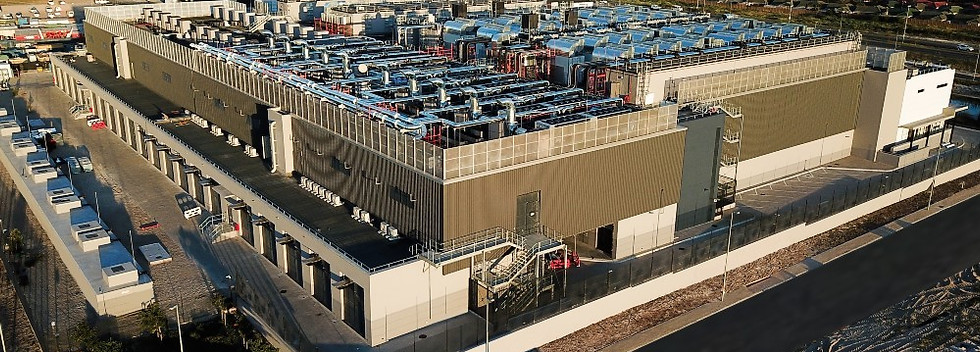
Data Centers
A Deeper Dive
What Concerns Do Communities Raise About Data Centers?
We have reviewed the draft ordinance and done independent research on Data Centers. Read on for a deeper dive into the concerns communities raise about data centers and the questions we feel need to be answered by the Township.
Environmental Concerns
-
Water Usage:
Data centers, especially those using water-cooled systems, can consume vast amounts of water, potentially straining local water supplies, particularly in arid regions. In 2024, Chester County experienced drought conditions for 7 months, with EVT identified as an extremely high- impact area. Will corporate enterprises be prioritized over residents if shortages occur?
https://utulsa.edu/news/data-centers-draining-resources-in-water-stressed-communities/
-
Energy Consumption:
Data Centers are energy-intensive facilities, requiring significant amounts of electricity, which can lead to increased greenhouse gas emissions and strain on the power grid. According to the Electric Power Research Institute (EPRI), new data centers are being built that would consume anywhere from 100 to 1,000 megawatts of energy—roughly the equivalent of 80,000 to 800,000 homes worth of electricity.
If the current infrastructure does not meet the energy needs, substations and transmission lines and maybe a new power plant may need to be added in EVT. Oftentimes the additional cost for building this infrastructure falls on rate-payers with increased monthly fees.
https://whyy.org/articles/ai-data-centers-delaware-valley-electricity-strain/
https://www.alleghenyinstitute.org/can-pennsylvanias-energy-supply-keep-up-with-demand/
-
Noise Pollution:
Described as constant humming, data centers run 24 hours a day, 365 days a year. Data center noise is heard at high and low frequencies, it can be so low our ears barely pick it up, but we can still be affected by it because even when our ears stop noticing it our brains still register the sound which can cause an impact.
The large cooling system fans and backup generators can generate significant noise, disturbing nearby residents, and while generators are not run daily, they must be tested and may be used as an energy source at any time if more electricity is needed. As the draft ordinance stands there are not enough “guardrails” concerning Noise Pollution.
-
Air Quality:
Backup generators, particularly diesel generators, can emit pollutants like particulate matter, nitrogen oxides, and sulfur dioxide, affecting air quality. Diesel generator emissions can pose a threat to the health of area residents if they run at times other than during rare emergencies. In East Vincent and East Coventry the air quality level of fine particulate matter is already higher than surrounding communities.
https://environmentamerica.org/pennsylvania/center/media-center/release-new-study-details-environmental-consumer-costs-of-data-center-expansion/
https://spectrum.ieee.org/data-centers-pollution (cut and paste link in browser)
Resource Strain
-
Electricity Demand:
The high electricity consumption can put a strain on the local power grid, potentially leading to blackouts or increased costs for residents. According to PennEnvironment, “Data centers in the U.S. are projected to require up to 400 terawatt-hours of energy each year by 2030. That’s equivalent to the energy used by almost 20 million homes each year.”
https://whyy.org/articles/ai-data-centers-delaware-valley-electricity-strain/
https://environmentamerica.org/pennsylvania/resources/big-data-centers-big-problems/
-
Land Use:
Data centers often require large plots of land, which can compete with agricultural, residential or commercial development that aligns with our rural character. Does having one Data Center attract more because the electrical infrastructure is in place?
-
Roadway Impacts:
Construction and operation of data centers can increase traffic in the surrounding area. How will large diesel fuel haulers impact our Residential two-lane Roads with no sidewalks and who will pay for maintenance and repairs?
-
Emergency Preparedness:
Is there sufficient emergency services capacity and capability? Who will pay to expand these services and capability? Would evacuation ever be necessary? Who creates the necessary plans to support this category of concern?
Social and Economic Concerns
-
Tax Revenues:
What are the projected Property tax revenues to the Township? Are these revenues worth all the other costs? Has the township identified all potential financial impacts of data centers to ensure these costs are not borne by residents? Has anyone confirmed that actual tax revenues equate to expected tax revenues? A recent report indicates the state is on track to lose $43 million in tax revenue to the data center credit this upcoming fiscal year.
https://www.spotlightpa.org/news/2025/06/amazon-data-centers-pennsylvania-tax-break-energy-grid/
-
Job Creation:
While data centers create some jobs, the number is often relatively low compared to the land area and resources consumed, leading to concerns about the cost-benefit ratio. Experienced technicians, who are employees of the data center, are brought in to work making the prospect of new jobs unlikely.
-
Visual Blight and Property Values:
Some find the massive scale and "blockhouse" architecture of data centers, and infrastructure such as high-tension transmission lines and power substations, unappealing and worry about their impact on property values.
-
Community Impact:
Some worry that the influx of data centers could change the character of a community, particularly in rural areas.
Other Concerns
-
Fit and Vision:
This use does not align with the goal to protect the rural character and charm of EVT. The township could pursue other alternatives as part of a larger effort to create an economic development plan for the areas zoned industrial and commercial, including Jones Motor, the 724 corridor, and Pennhurst, that prioritizes sustainability and sense of place.
-
Transparency and Accountability:
The opaque nature of data center operations raises concerns about accountability and potential security risks.
-
Expertise and Best Practices:
Data Centers are a highly complex use and require significant, in-depth technical knowledge. Does the township have the right experts working on the ordinance? Does the ordinance contain the most stringent environmental requirements to deliver the highest possible level of protection for the health and safety of residents, wildlife, and the environment?
